Smoking a pack of cigarettes a day, why do some people live their whole life without lung cancer?
For every 10 people who die from lung cancer, 8-9 of them smoke. That’s a statistic released by the US Centers for Disease Control and Prevention (CDC). But that doesn’t mean that 80-90% of smokers will get and die from lung cancer.
In fact, CDC statistics show that lung cancer only develops in about 10-20% of smokers.
That means there is a much larger percentage of people who smoke without lung cancer. On the contrary, there are people I haven’t smoked a single cigarette in my life but with this deadly disease.
In a new study published in the journal Nature Genetics, scientists have finally solved the mystery: Why some heavy smokers, who smoke a pack a day and for decades, get cancer. lungs still leave them out?
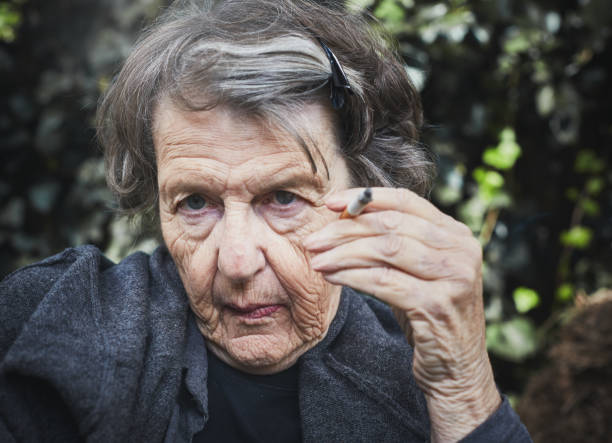
It must be said that this study is not an excuse for smokers. In fact, many smokers may have died from other diseases, like cardiovascular disease, before a cancerous tumor appeared in their lungs.
Statistics show that the life expectancy of smokers is shortened by an average of 25 years for many reasons, not just lung cancer. Out of 4 heavy smokers, 1 will not live past the age of 65.
In addition, children of smokers may also be at risk from genetic damage, if their parents had a history of smoking prior to conception. Smoking directly affects the fetus from in the womb and after birth if they continue to inhale secondhand smoke from their parents.
So for the 1.1 billion smokers on the planet, their advice has always been consistent: Quit smoking for the health of yourself and those around you.
Tobacco causes trillions of mutations, but do mutations lead to cancer?
That is the main question that scientists at the Albert Einstein College of Medicine posed in their research. Previously, it was assumed that mutations that accumulate in lung cells are the cause of cancer, regardless of whether the patient smokes or not.
In the general population, the lifetime risk of a person developing lung cancer is 6.7%. While for smokers it is between 20-30%. This is thought to be because smoking speeds up the process by which lung cells mutate that lead to cancer.
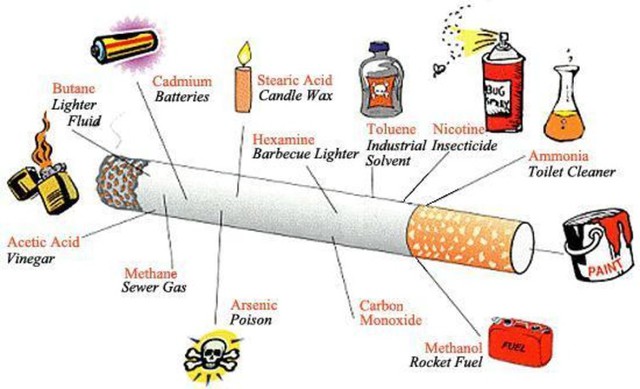
One cigarette releases more than 4,000 chemicals and they get into your lungs.
A 2016 study conducted by Los Alamos National Laboratory, USA, compared DNA in tumor tissue of 1,000 non-smokers and 2,500 smokers.
They counted out exactly how many mutations caused by smoking in different organs of the body. Accordingly, if a person smokes a pack of cigarettes a day, 365 days a year, they will cause:
150 mutations per lung cell, 97 mutations per larynx cell, 39 mutations per pharyngeal cell, 6 mutations per liver cell, 18 mutations per bladder cell, and 23 mutations in each oral cavity cell.
You should also note that this is the number of mutations that are divided equally between the cells. Let’s do one more simple calculation. A previous study showed that the average human liver contains about 240 billion cells. Smoking 1 pack of cigarettes a day causes 6 mutations in each liver cell. That’s 1.440 billion mutations in all, at this agency alone.
Another visualization in the lungs. Scientists calculate that for every 49 cigarettes, you will “light up” a new mutation. And each mutation is thought to increase your odds of getting cancer.
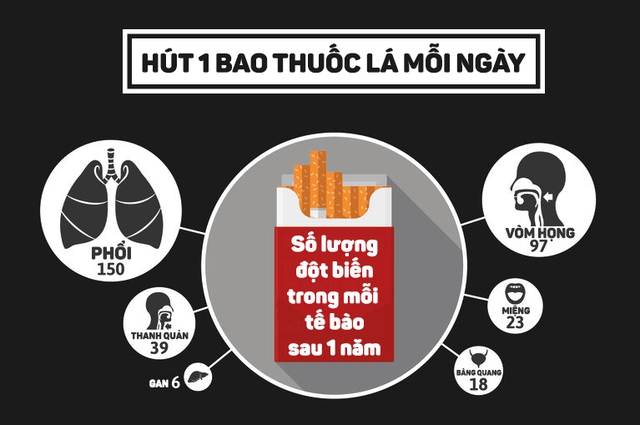
However, professor Dr. Jan Vijg, chair of the department of genetics at Albert Einstein College of Medicine, said the causal relationship between mutations in the lung and cancer risk remains a question mark that needs to be answered.
“Prior to our study, this was not possible because there was no way to accurately quantify mutations in normal cells.”, he said. The 2016 study used the genes of tumors in people who had smoked and non-smokers with lung cancer, but not in a group of healthy people.
Therefore, Professor Vijg wanted to examine the mutations that occurred in this neglected group of people, including smokers who had never had lung cancer.
Strange discovery: Stagnation of mutations in the 23rd year of smoking
To conduct the investigation, the team at the Albert Einstein College of Medicine recruited 33 volunteers including:
– 12 non-smoking adults aged 18-36
– 2 teenagers who don’t smoke
– 19 smokers aged 44-81
They then collected lung and tracheal cells from these individuals. “These lung cells live very long, often years to decades. Thus, they can accumulate mutations both with age and from smoking habits“, explains epidemiologist and histopathologist Simon Spivack at the Albert Einstein College of Medicine. “Of all the cell types in the lung, this is one of the most likely to become cancerous.”
The genetic analysis technique used in this study is also an advanced technique developed by Professor Vijg himself. It is called single-cell multiple-shift amplification (SCMDA), which has the advantage of reducing sequencing errors and better identifying mutations when compared to other sequencing methods.
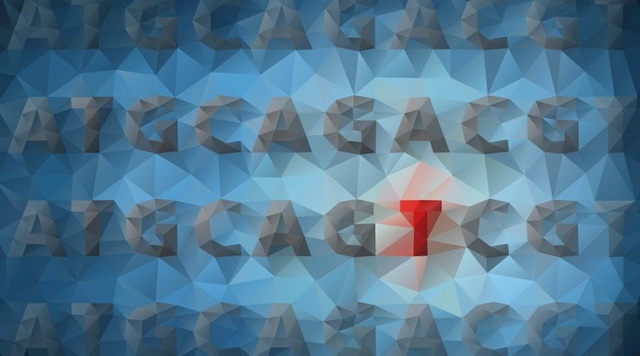
The results show that people who smoke more are actually building up more mutations in their lungs. It’s a function that increases linearly since “smoking year” first to the 23rd smoking year.
The smoking year is defined as the time period in which a smoker consumes 1 pack of 2 cigarettes per day and lasts for 365 days. However, the numbers can add up if smokers consume more, or stretch if they smoke less.
A person who smokes 2 packs of cigarettes a day for 365 days is counted as having spent 2 years smoking. After the 23rd year of smoking, the mutations in the smoker’s lungs did not increase further, but leveled off.
“This means that the heaviest smokers don’t necessarily bear the highest mutation burden.”, Spivack said. In this study, there were people who had experienced up to 116 “smoking years,” and that person’s number of mutations did not increase linearly.
Professor Vijg explains: “First, some smokers may have a better detoxification system to break down potentially mutagenic compounds in cigarette smoke, before they can cause DNA damage to cellular genomes.
Second, they may have a superior DNA repair system, which helps to process DNA damages and heal them quickly. We are particularly interested in this second possibility, as we can test and confirm it with our methodology.”
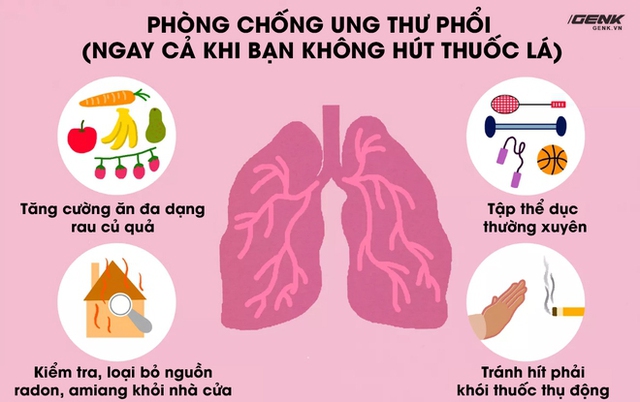
The new finding could help explain why between 80 and 90 percent of lifelong smokers never develop lung cancer. It may also explain why some people who never smoke develop tumors.
While cigarette smoke actually triggers more cellular mutations in the lungs, whether these mutations eventually develop into cancerous tumors depends on how effectively the body tolerates the substances. toxic and organizes repair of DNA damage after they appear.
Those lucky enough to have inherited efficient DNA repair genes have a higher immunity to cancer. Meanwhile, some previous studies showed that diet may also affect this repair process.
Professor Vijg said: “As a follow-up work, we want to develop new tests that can measure someone’s ability to repair or detoxify DNA. This method can be used to assess people’s risk of lung cancer.”
Synthetic
at Blogtuan.info – Source: genk.vn – Read the original article here

